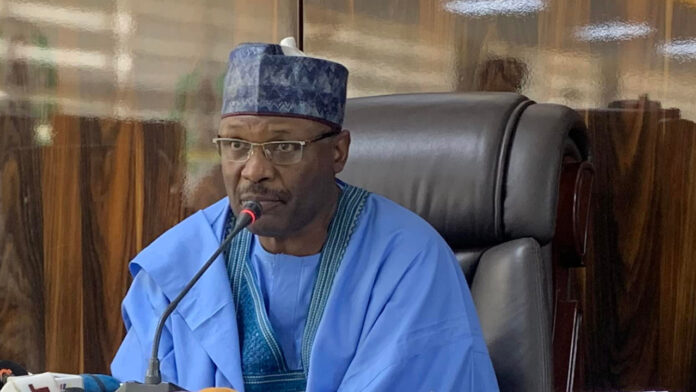Immediate past chairman of the Independent National Electoral Commission (INEC), Professor Mahmoud Yakubu has blamed conflicting court orders, unwarranted litigations, violence and poor logistic arrangements to the challenges his commission confronted in its pursuit to deliver credible polls during huis ten years at the helm of affairs
Yakubu, who completed his second term as INEC chairman last week, was immediately replaced by president Bola Tinubu, who announced the appointment of Professor Joash Ojo Amupitan as his successor, before the National Council State meeting last Thursday
Yakubu’s INEC faced several criticisms, especially from the manner he was said to have handled the conduct of the 2023 general election, after assuring Nigerians of the commission’s readiness to conduct what he described as a credible election that would meet up with international expectations
The former Chief election umpire however admitted that 2015 to 2025, was marred with relentless crises that threatened the credibility of Nigeria’s electoral process, despite reforms and innovations introduced during the period.
Professor Yakubu painted a sober reflection of the election period under his watch, when he wrote in a recent publication, Election Management in Nigeria: 2015–2025
He regretted that INEC under his leadership battled several litigations, adding that it was similarly faced with the challenge of interpreting conflicting and contradictory court orders from politicians and courts of concurrent jurisdiction, which he noted created legal confusion and disrupted preparations for elections.
He also blamed the menace of vote trading, persistent logistical breakdowns that forced nationwide postponements, and targeted violence against election officials as some of the most destabilising problems.
“The 2015–2025 decade was not without its challenges. Conflicting court orders, violence targeted at our staff and facilities, the scourge of vote trading, and persistent logistics bottlenecks continued to test the credibility and smooth conduct of elections
“Beyond human and legal hurdles, technical failures also dogged INEC’s operations. Equipment breakdowns and network collapses sometimes crippled accreditation and delayed transmission of results, raising public doubts about the reliability of the system.
“While the commission introduced reforms such as deploying the Bi-Modal Voter Accreditation System (BVAS), the INEC Voter Enrolment Device (IVED), and the INEC Results Viewing (IReV) portal,” Yakubu acknowledged that technology alone could not insulate elections from deeply rooted challenges.
The former INEC boss therefore warned that the future of election management in Nigeria remains fraught with uncertainties, stressing that it is only by confronting these persistent failures head-on, while consolidating gains from reforms, that INEC can hope to deliver credible elections.
According to him, “The commission must fully embrace both successes and failures. We must intensify confidence and trust-building measures, expand inclusivity, and remain proactive in addressing potential threats to our elections.”

